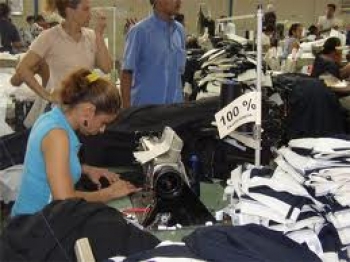 While labour markets have improved considerably in Central America in the past decade, women in the region suffered disproportionally from the consequences of the financial crisis of 2008. According to UNIFEM, about half a million people lost their jobs during the crisis, 50% of whom were women. It is important to highlight that in Central America only four out of ten women, 38% of those of working age, participate in the labour force, compared to 53% in the rest of Latin America. In Central America, women have significantly low levels of employment, or provide informal and sub-employment labour, which are also higher relative to man.
While labour markets have improved considerably in Central America in the past decade, women in the region suffered disproportionally from the consequences of the financial crisis of 2008. According to UNIFEM, about half a million people lost their jobs during the crisis, 50% of whom were women. It is important to highlight that in Central America only four out of ten women, 38% of those of working age, participate in the labour force, compared to 53% in the rest of Latin America. In Central America, women have significantly low levels of employment, or provide informal and sub-employment labour, which are also higher relative to man.
While labour markets show a positive correlation between levels of education and access to employment amongst women (34% of uneducated women work, compared to 68% of educated women), the main obstacle for women remains the gender division of labour, which explains why an increase in educational level has not been enough to improve women’s participation in the workforce. In Central America, the majority of women who are currently employed are of reproductive age, making them extremely vulnerable to discrimination because of maternity and family responsibilities.
These differences in the workforce are mainly due to gender stereotypes, and discrimination associated with maternity and family responsibilities. Tensions between work and the family entail a high cost not only to women and those to whom they provide care, but also to the national economy, the proper functioning of its labour market and the productivity of its enterprises. Women in the region suffer not only from horizontal but from vertical segregation of labour and the effects of the glass ceiling.
These are just some of the reasons why the work of organizations such as COMUCAP, the Coordination of Rural Women in La Paz, Honduras and COOPEMUS, the Agro-industrial Cooperative of Women of Sotomillo, Nicaragua, are crucial in promoting better economic opportunities to women.
COOPEMUS is located in Sotomillo, Nicaragua, with over 40 members, all of them women, working together in the production and processing of organic cashew nuts. Members have been trained to manage the cooperative and about 20 of their members work full time in the processing factory, providing them with better opportunities and prospects. One member explained that, “the work in the cooperative has changed my life”. COOPEMUS is exporting its products to international markets including Spain and has provided new economic opportunities to the women of Sotomillo.
COMUCAP was established in 1993 by Dulce Marlene Contreras to fight domestic violence and poverty amongst women in the rural area of La Paz, Honduras. “We realized that until women are economically empowered, they will not be empowered to escape abuse for good,” she says. Since then COMUCAP has provided a series of services to equip its members and their families with greater economic opportunities. COMUCAP has 254 members from across La Paz. Services they provide include microfinance loans, technical support for organic agriculture, literacy and vocational programs, small business sales support and political advocacy. COMUCAP provides local women with economic opportunities that were inexistent before; helping them to obtain training and support to start their own farming businesses and improve the quality of life of their families. Members of the cooperative use these skills to run their own successful organic aloe vera and award-winning Fair Trade and certified organic coffee enterprises. Other members have been trained in running a bakery, offering eco-tourism cabins, growing oranges, producing honey and selling organic fertilizers.
COMUCAP has not only helped to improve the economic and employment situation of women in this region of Honduras, but to help to put a stop to domestic violence, with women now viewed as economic contributors to their families.

